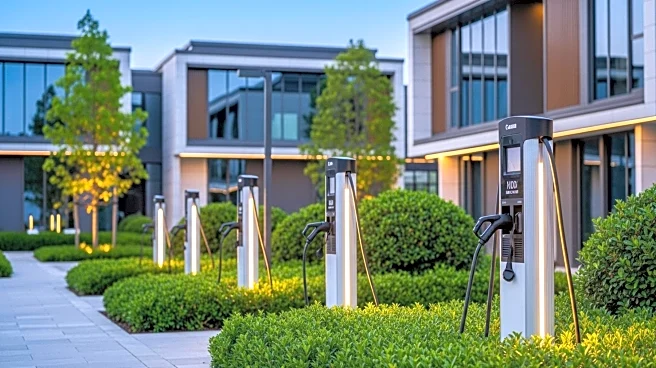What is the story about?
What's Happening?
Equity Residential, a significant player in the multifamily real estate market, is increasingly focusing on integrating electric vehicle (EV) charging stations as a standard amenity in apartment complexes. This trend is driven by a growing demand for EV infrastructure among residents and mandates from various states requiring new constructions to be equipped for EV charging. Theresa Kaiser-White, Vice President for Asset Management and Procurement at Willow Bridge Property Company, highlighted during a Forth Mobility webinar that developers are advancing initiatives for EV charging, likening its necessity to that of cable television in the past. The approach to implementing these charging stations varies, with some property owners opting for third-party installations and operations, potentially involving revenue-sharing agreements. However, concerns have been raised about the fairness of charging rates set by third-party vendors.
Why It's Important?
The push for EV charging infrastructure in multifamily housing reflects broader shifts in consumer expectations and regulatory landscapes. As electric vehicle adoption rises, with EVs comprising about 10% of new vehicle sales last year, the demand for accessible charging solutions is becoming a critical factor in real estate development. This trend not only impacts property owners and developers but also charge-point providers and policymakers who must navigate the complexities of integrating EV infrastructure into existing and new properties. The move towards EV charging is indicative of a larger transition towards sustainable living solutions, potentially influencing property values and tenant satisfaction.
What's Next?
As the adoption of electric vehicles continues to grow, albeit with a potential slowdown due to the winding down of federal purchase incentives, the multifamily housing sector will need to adapt to these changes. Developers and property managers will likely need to collaborate more closely with utilities and policymakers to ensure the effective deployment and management of EV charging infrastructure. Additionally, incentive programs may need to be tailored to accommodate different building scenarios and market segments, ensuring that the transition to EV-friendly housing is both feasible and beneficial for all stakeholders involved.
Beyond the Headlines
The integration of EV charging stations in apartment complexes raises important considerations about the future of urban living and sustainability. As more residents demand eco-friendly amenities, the real estate market may see a shift towards greener building practices and technologies. This could lead to a reevaluation of building codes and standards, as well as increased collaboration between the real estate and energy sectors to support the growing infrastructure needs of electric vehicles.















